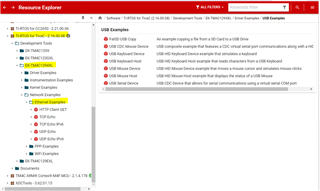Other Parts Discussed in Thread: CC3100
Hi All,
I am using TI RTOS and tm4c129encpdt mnicrocontroller. I had a requirement where I wanted to find the mac address of a device using its ip address. As per this example,
I have done it in wifi project which uses cc3100.
But now I have an ethernet project too and wanted to do the same thing there. I was trying but I am not able to make this work. I replaced the socket api calls with ethernet socket api.
Let me know if someone can fix this.
Attaching code for ethernet. (For wifi code, one ccan visit the above provided link as the whole code is working fine for cc3100).
void Wireless_Build_Arp_Packet(char* buf, unsigned char * src_mac, unsigned char *src_ip,
unsigned char * dest_mac, unsigned char *dest_ip)
{
struct arp_hdr* arp1;
struct arp_ethip* ethip;
struct arp_eth_hdr* ethhdr1;
unsigned char eth_type[2] = {0x08, 0x06}; // for arp
// unsigned char eth_type[2] = {0x80, 0x35}; // for rarp
ethhdr1 = (struct arp_eth_hdr*)buf;
memcpy(ethhdr1->dst_mac, dest_mac, ETH_ADDR_LEN);
memcpy(ethhdr1->src_mac, src_mac, ETH_ADDR_LEN);
memcpy(ethhdr1->type, eth_type, 2);
arp1 = (struct arp_hdr*)(buf+ ETH_HDR_LEN);
arp1->ar_hrd = sl_Htons(ARP_HRD_ETH);
arp1->ar_pro = sl_Htons(ARP_PRO_IP);
arp1->ar_hln = ETH_ADDR_LEN;
arp1->ar_pln = IP_ADDR_LEN;
arp1->ar_op = sl_Htons(ARP_HRD_ETH);
ethip = (struct arp_ethip*)(buf + ARP_HDR_LEN + ETH_HDR_LEN);
memcpy(ethip->ar_sha, src_mac, ETH_ADDR_LEN);
memcpy(ethip->ar_spa, src_ip, IP_ADDR_LEN);
memcpy(ethip->ar_tha, dest_mac, ETH_ADDR_LEN);
memcpy(ethip->ar_tpa, dest_ip, IP_ADDR_LEN);
}
void Wireless_Decode_Arp_Packet(char* buf){
struct arp_hdr* arp1;
struct arp_ethip* ethip;
struct arp_eth_hdr* ethhdr1;
ethhdr1 = (struct arp_eth_hdr*)buf;
// Mac address we were trying to get..
// Need to return this using pointers
logAsHexStr("Dest Mac address------ %s", "", ethhdr1->src_mac,6);
arp1 = (struct arp_hdr*)(buf+ ETH_HDR_LEN);
ethip = (struct arp_ethip*)(buf + ARP_HDR_LEN + ETH_HDR_LEN);
// UART_PRINT("\n\rGot ARP response!\n\r");
// UART_PRINT("\n\rIP addr %i.%i.%i.%i ",ethip->ar_spa[0],ethip->ar_spa[1],ethip->ar_spa[2],ethip->ar_spa[3]);
// UART_PRINT("maps to MAC addr %x:%x:%x:%x:%x:%x!\n\r",ethip->ar_sha[0],ethip->ar_sha[1],ethip->ar_sha[2],ethip->ar_sha[3],ethip->ar_sha[4],ethip->ar_sha[5]);
// struct arp_hdr* arp1;
// struct arp_ethip* ethip;
// struct arp_eth_hdr* ethhdr1;
//
// char d_ipAdd[6] = {0};
// char d_mac[8] = {0};
//
// strncpy(buf+26, d_ipAdd, 4);
//
//
//
// // ethhdr1 = (struct arp_ethip*)buf;
// ethhdr1 = (struct arp_eth_hdr*)buf;
//
//
// strncpy(ethhdr1->src_mac, d_mac, 6);
//
// logAsHexStr("Dest Mac address------ %s", "", ethhdr1->src_mac, 6);
// logStr("Dest IP add -------- %s", "", d_ipAdd);
// logAsHexStr("Dest ip address in hex ------ %s", "", d_ipAdd, 4);
//
////
//
//
////
//// ethip = (struct arp_ethip*)(buf+ ETH_HDR_LEN);
//// arp1 = (struct arp_hdr*)(buf + ARP_HDR_LEN + ETH_HDR_LEN);
//
// arp1 = (struct arp_hdr*)(buf+ ETH_HDR_LEN);
// ethip = (struct arp_ethip*)(buf + ARP_HDR_LEN + ETH_HDR_LEN);
// // UART_PRINT("\n\rGot ARP response!\n\r");
// // UART_PRINT("\n\rIP addr %i.%i.%i.%i ",ethip->ar_spa[0],ethip->ar_spa[1],ethip->ar_spa[2],ethip->ar_spa[3]);
// // UART_PRINT("maps to MAC addr %x:%x:%x:%x:%x:%x!\n\r",ethip->ar_sha[0],ethip->ar_sha[1],ethip->ar_sha[2],ethip->ar_sha[3],ethip->ar_sha[4],ethip->ar_sha[5]);
//
}
char buf4[200];
void arp_protocol( unsigned char *s_mac, unsigned char *s_ip, unsigned char *d_mac, unsigned char *d_ip)
{
int fd, ret, len;
uint32_t header = 1;
//SlTimeval_t tTimeout;
// fd = socket(AF_PACKET, SOCK_RAW, IPPROTO_RAW); // working for wifi
fd = socket(AF_INET, SOCK_RAW, IPPROTO_IP);
Wireless_Build_Arp_Packet(buf4, s_mac, s_ip, d_mac, d_ip);
len = ARP_HDR_LEN + ARP_ETHIP_LEN + ETH_HDR_LEN;
ret = send(fd, buf4, len, 0);
__delay_cycles(5000000000);
logg("recv arp packet....", "");
ret = recv(fd, buf4, 200,0);
logg(" arp done... now decoding....", "");
Wireless_Decode_Arp_Packet(buf4);
close(fd);
}
Seems like this is not working because in this line- in above code,
fd = socket(AF_INET, SOCK_RAW, IPPROTO_IP);
we don't have proper macros. (Please take reference from the above link).
Thanks


